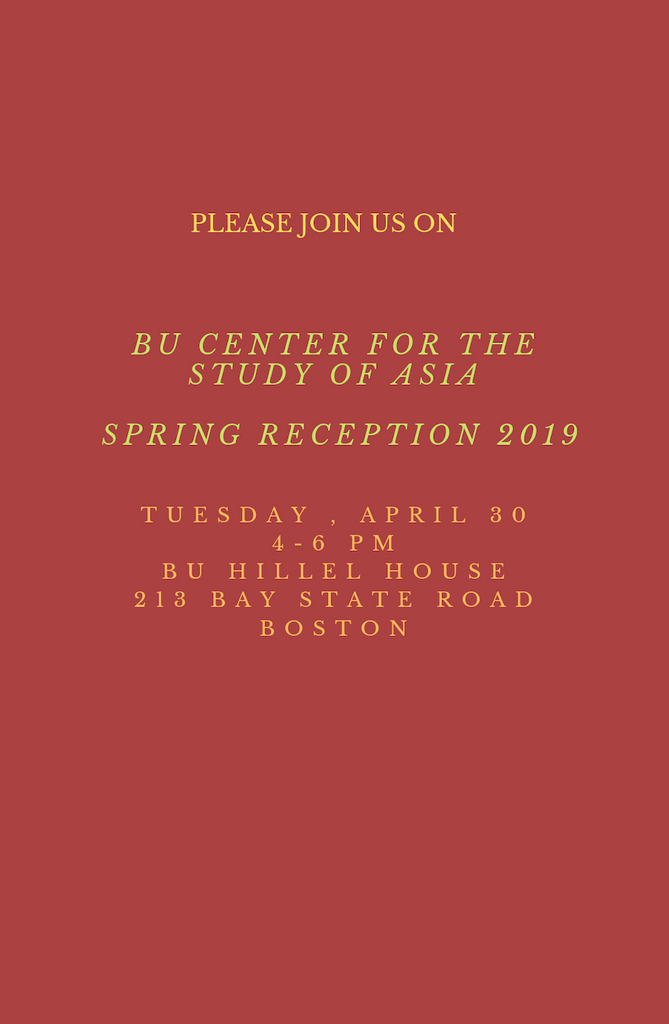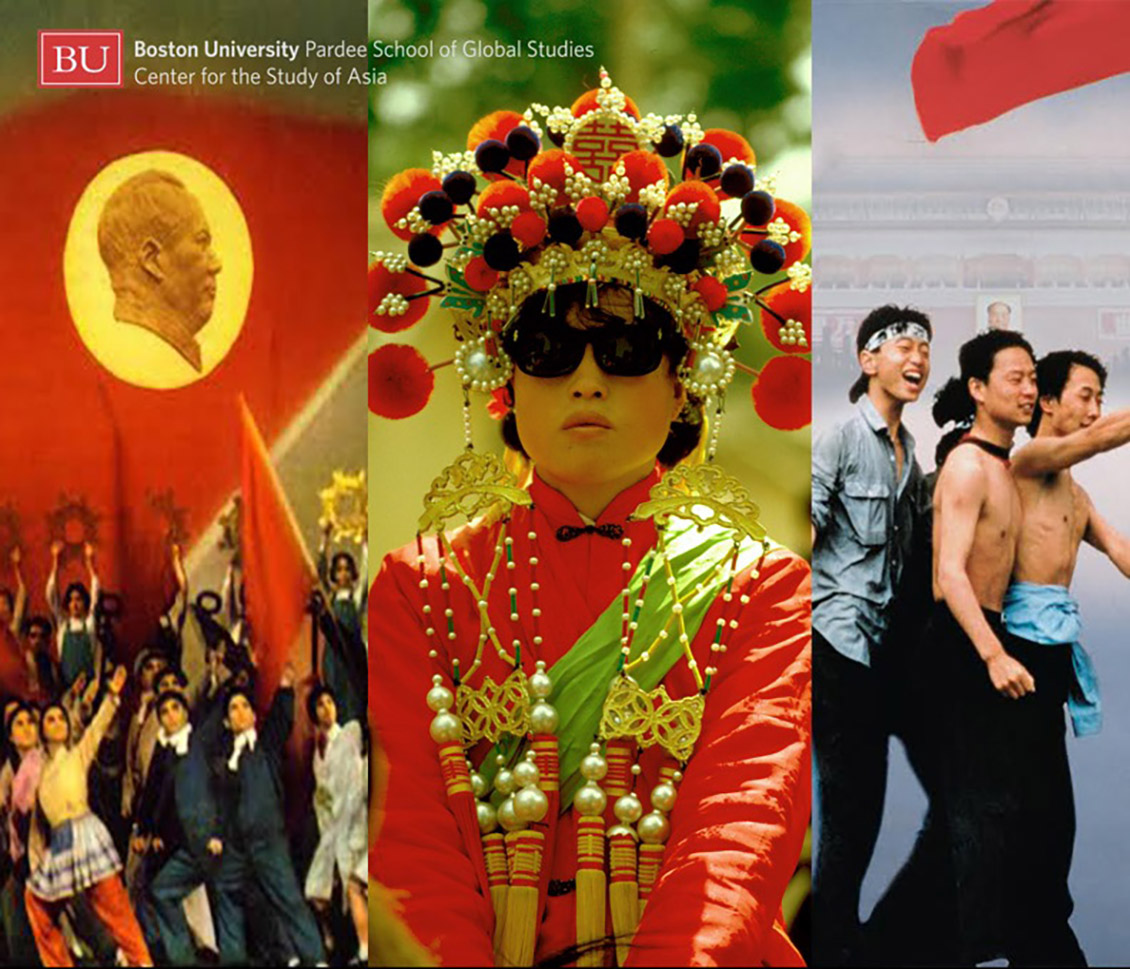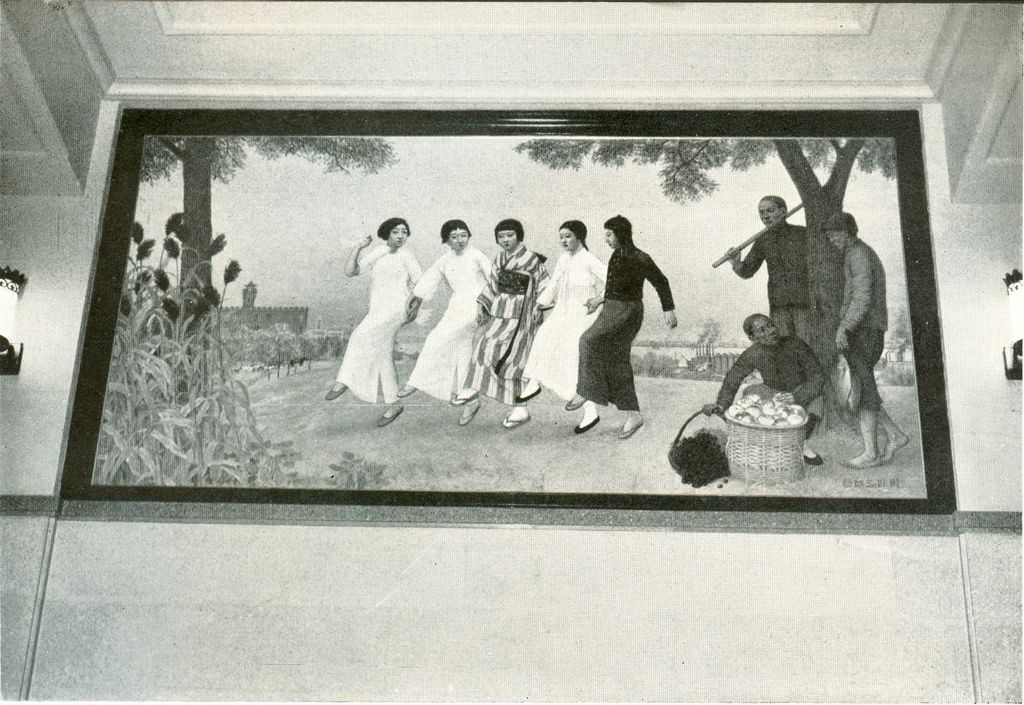History in Images, History in Words: In Search of Facts in Documentary Filmmaking
History in Images, History in Words:
In Search of Facts
in Documentary Filmmaking
A lecture by Carma Hinton
Robinson Professor of Visual Culture and Chinese Studies at George Mason University
Monday April 10, 2017 from 4-7 pm
at the Photonics Center (9th fl.), 8 St. Mary’s Street, Boston University
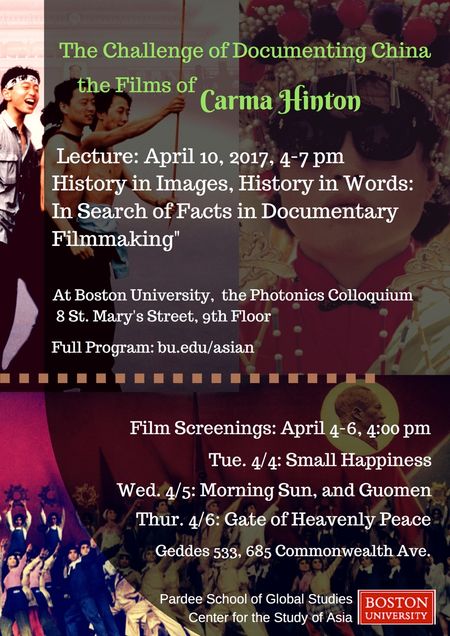 My presentation will focus on the process of documentary filmmaking, especially the many challenges my team and I faced in trying to create engaging filmic narratives that are both factually accurate and encompass multiple perspectives. I will use excerpts from my films as well as out-takes to illustrate the difficulties in determining what information to include and exclude, assess the compromises involved in the choices, and explore the consequences of taking various possible paths. I will also address the different problems that a historian encounters when presenting history in images as opposed to in words: the potential and limitation of each medium and what information each might privilege or obscure. I believe that in this age of “alternative facts” and “parallel universes,” reflections on the challenges in obtaining authenticity and truth and the importance of relentlessly striving to reach this goal, take on particularly urgent meaning.
My presentation will focus on the process of documentary filmmaking, especially the many challenges my team and I faced in trying to create engaging filmic narratives that are both factually accurate and encompass multiple perspectives. I will use excerpts from my films as well as out-takes to illustrate the difficulties in determining what information to include and exclude, assess the compromises involved in the choices, and explore the consequences of taking various possible paths. I will also address the different problems that a historian encounters when presenting history in images as opposed to in words: the potential and limitation of each medium and what information each might privilege or obscure. I believe that in this age of “alternative facts” and “parallel universes,” reflections on the challenges in obtaining authenticity and truth and the importance of relentlessly striving to reach this goal, take on particularly urgent meaning.
About the speaker:
Carma Hinton is an art historian and a filmmaker. She received her Ph.D. in Art History from Harvard University and is now Robinson Professor of Visual Culture and Chinese Studies at George Mason University. Together with Richard Gordon, Hinton has directed many documentary films, including Small Happiness, All Under Heaven, To Taste a Hundred Herbs, Abode of Illusion: The Life and Art of Chang Dai-chien, The Gate of Heavenly Peace, and Morning Sun. She has won two Peabody Awards, the American Historical Association’s John E. O’Connor Film Award, the International Critics Prize and the Best Social and Political Documentary at the Banff Television Festival, and a National News & Documentary Emmy, among others. Hinton is currently working on a book about Chinese scrolls depicting the theme of demon quelling. Carma Hinton was born in Beijing. Chinese is her first language and culture.

Archaic Avant-Garde: Contemporary Japanese Ceramics from the Horvitz Collection (Worcester Art Museum, through March 1, 2020)
 While modern and contemporary artists are known to have looked outside their immediate cultural realm to expand their sources for modern inspiration, many of them at the same time were also looking at their own culture's ancient techniques and forms. Archaic Avant-Garde focuses on contemporary Japan's leading ceramicists who have explored and experimented with ancient Japanese pottery techniques and forms to invigorate their own modern creations. This case rotation features works from such renowned late twentieth-century potters as Kamoda Shoji, Mori Togaku, and Mihara Ken, to emerging stars such as Isezaki Koichiro.
While modern and contemporary artists are known to have looked outside their immediate cultural realm to expand their sources for modern inspiration, many of them at the same time were also looking at their own culture's ancient techniques and forms. Archaic Avant-Garde focuses on contemporary Japan's leading ceramicists who have explored and experimented with ancient Japanese pottery techniques and forms to invigorate their own modern creations. This case rotation features works from such renowned late twentieth-century potters as Kamoda Shoji, Mori Togaku, and Mihara Ken, to emerging stars such as Isezaki Koichiro.
https://www.worcesterart.org/exhibitions/archaic-avant-garde/
The Tale of Genji: A Japanese Classic Illuminated (Metropolitan Museum of Art, through June 16, 2019)
The Metropolitan Museum of Art (NY) presents the first major loan exhibition in North America to focus on the artistic tradition inspired by Japan's most celebrated work of literature, The Tale of Genji. Written by Murasaki 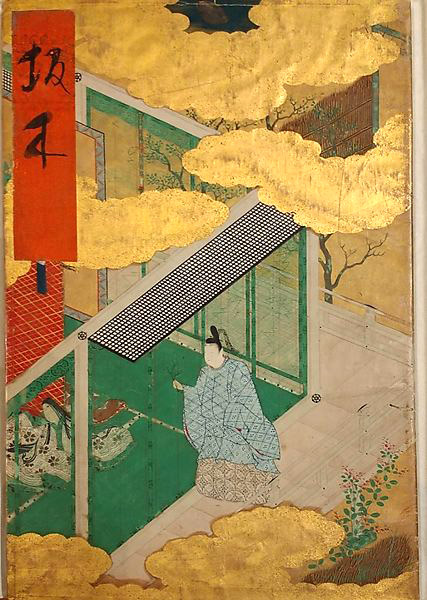
Shikibu, a lady-in-waiting in the early eleventh-century imperial court, and often referred to as the world's first psychological novel, the tale recounts the amorous escapades of the "Shining Prince" Genji and introduces some of the most iconic female characters in the history of Japanese literature. Covering the period from the eleventh century to the present, the exhibition features more than 120 works, including paintings, calligraphy, silk robes, lacquer wedding set items, a palanquin for the shogun's bride, and popular art such as ukiyo-e prints and modern manga. Highlights include two National Treasures and several works recognized as Important Cultural Properties. For the first time ever outside Japan, rare works are on view from Ishiyamadera Temple—where, according to legend, Shikibu started writing the tale.
https://www.metmuseum.org/exhibitions/listings/2019/tale-of-genji
Japanomania! Japanese Art Goes Global, at the Peabody Essex Museum (ongoing)
Japanomania! Japanese Art Goes Global
at the Peabody Essex Museum, 161 Essex Street, Salem, MA
https://www.pem.org/exhibitions/japanomania-japanese-art-goes-global

Discover the beauty and complex stories behind PEM’s celebrated Japanese export art collection. The new installation takes visitors on a journey through time — from the arrival of Portuguese merchants in the 1500s through Japan’s emergence on the world stage in the late 19th century and beyond. Throughout, the story is punctuated with stunning works of art, including extraordinary loans from a private collection and many objects on view for the first time since PEM’s 2016 exhibition Asia in Amsterdam.
Japanomania! Japanese Art Goes Global is made possible by the generous support of an anonymous donor, the late Mrs. Lammot du Pont Copeland and The Lee and Juliet Folger Fund.
Image credit: Sanrio Company, Ltd., Hello Kitty rotary telephone, 1980s. Plastic, metal and electrical components. Museum purchase. 2018.4.1. Artists in Arita, Japan, Incense holder, about 1690. Porcelain and lacquered silver. Gift of the estate of Mrs. Lammot du Pont Copeland, 2001. AE85878.A. Photo by Kathy Tarantola/PEM.
Performing Music of Bali! BU Summer 2 course offering
Interested in learning about the music of Bali? Enroll in the BU Summer 2 course
MH 563: Performing Music of Bali
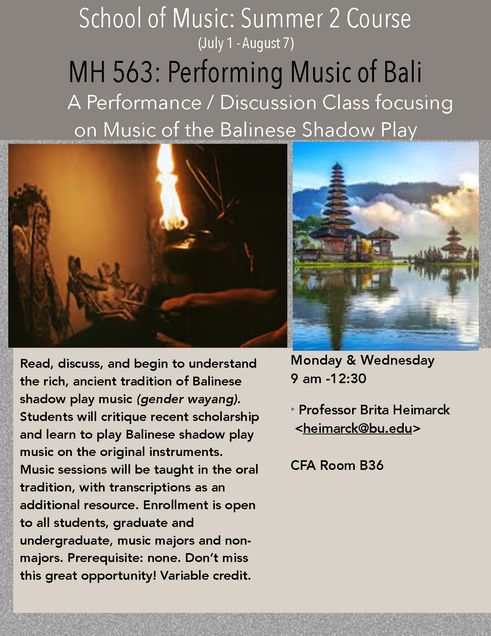
SSRC Korean Studies Summer Dissertation Workshop (Applic. deadline June 3, 2019)
SSRC Korean Studies Dissertation Workshop
Application Deadline – June 3, 2019
August 12–15, Hilton Westchester in Rye Brook, NY
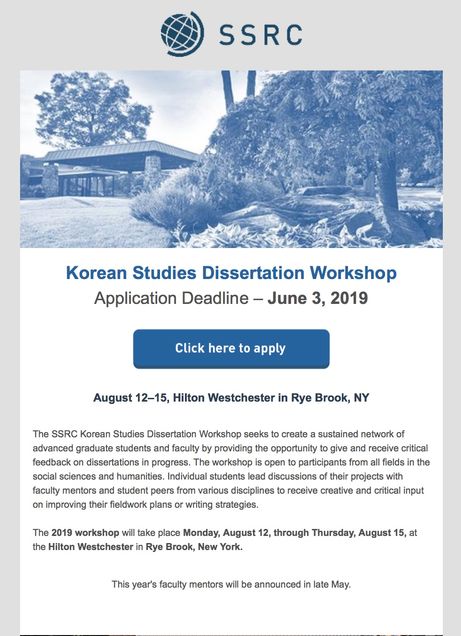
The workshop welcomes applications from students who have not yet begun fieldwork, who are currently in the field, and who are in the process of writing their dissertations. To the extent its budget allows, SSRC will cover travel to the workshop. The SSRC will fully cover participants' lodging and meals for the duration of the workshop. Funding for the program is provided by the Academy of Korean Studies.
Eligibility and Application
Full-time advanced graduate students, regardless of citizenship, are eligible for the workshop.
Applicants must have ABD (all but dissertation) status and an approved dissertation prospectus at the time of application, but cannot have completed writing for final submission.
Special consideration will be given to students from universities that are not major Korean studies institutions.
A narrative description of the dissertation topic, a short application form, and a letter of recommendation from the student's primary advisor are required as part of the application. Learn more about the workshop and the experiences of past participants here.
Deadline: June 3, 2019
Social Science Research Council
300 Cadman Plaza West, 15th Floor
Brooklyn, NY 11201
Congratulations to Ha Jin (Jin Xuefei) on his appointment as William Fairfield Warren Distinguished Professor
Congratulations to Prof. Ha Jin (Jin Xuefei)
on his appointment as William Fairfield Warren Distinguished Professor, announced by Boston University President Robert Brown on April 29, 2019.

President Brown's announcement letter includes the following:
"A 1994 graduate of Boston University’s Creative Writing Program, Xuefei Jin (pen name Ha Jin) returned to the Department of English in 2002 as a full professor. Born in China, he was a teenager when China entered the Cultural Revolution and he became a member of the People’s Liberation Army at the age of 14, an experience he would later revisit in his written work. He was studying in the United States at the time of the Tiananmen Square demonstrations and suppression and realized at that time that he would be unable to return to China. His work examines themes of exile, immigration, and the now ever-present global experience of movement among cultures; his course “The Writer as Exile” is a key element of the international focus of the University’s Creative Writing Program. His novel Waiting, based on his experiences in the Red Army, was awarded the National Book Award for Fiction and the PEN/Faulkner Award and was a finalist for a Pulitzer Prize (as was his novel War Trash in 2005). His newest books are A Distant Center (2018) and his first nonfiction book, The Banished Immortal: A Life of Li Bai (2019). His work has been translated into more than 30 languages. He is a member of the American Academy of Arts & Sciences and the American Academy of Arts and Letters. Ha Jin received his BA from Heilongjiang University and his master’s from Shandong University, both in China, and in 1986 came to the United States to earn his PhD at Brandeis."
Library of Congress Chinese Rare Book Digital Collection now available!
Cultural historians , ethnologists, philologists, and all interested audiences will want to know about a trove of historical research materials on China that is now available from the Library of Congress. The Chinese Rare Books presentation is now available at https://www.loc.gov/collections/chinese-rare-books/about-this-collection/ . This project has been underway for many years, and the initial release makes available more than a thousand titles comprised of more than five hundred thousand images. LC digitized these in collaboration with the National Central Library of Taiwan, recognizing the collection as the most valuable Chinese classical resource. It encompasses a wide array of disciplines and subjects: Chinese ancient classics, manuscripts, Buddhist sutras, hand-painted pictures, local gazetteers and ancient maps. In addition to the rich content, it introduces a new interface for navigating to multi-part objects via a drop-down menu on the search results page (https://www.loc.gov/collections/chinese-rare-books/ ), and enables navigation between an item’s different resources from the single-page view (e.g.https://www.loc.gov/resource/lcnclscd.unk85040106.1A000/?sp=1 ).
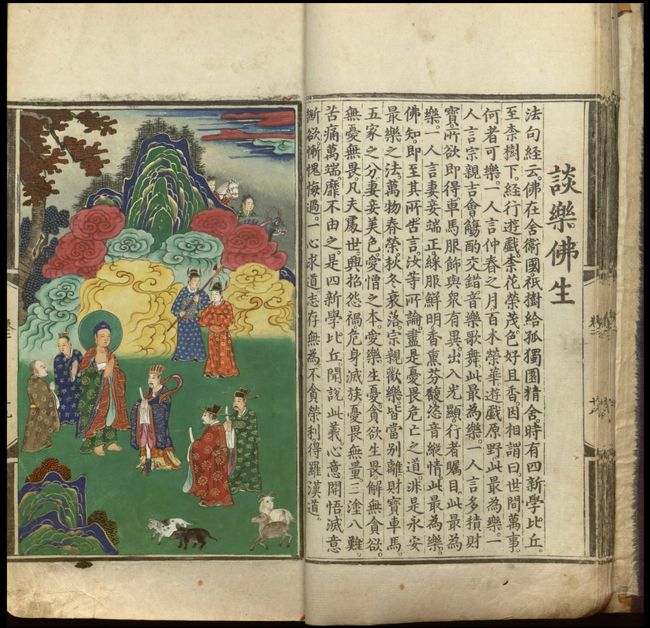
June Grasso’s new book, Japan’s ‘New Deal’ for China: Propaganda Aimed at Americans Before Pearl Harbor (Routledge, 2019)
Congratulations to Prof. June Grasso (College of General Studies, Boston University) on the publication of her new book,

Details can be found here https://www.routledge.com/Japans-New-Deal-for-China-Propaganda-Aimed-at-Americans-before-Pearl/Grasso/p/book/9780815369301
An interview with the author, published at http://www.bu.edu/cgs/2019/01/25/a-qa-with-june-grasso-japanese-propaganda-aimed-at-americans-before-world-war-ii/, is reprinted below:
A Q&A with June Grasso: Japanese Propaganda Aimed at Americans Before World War II
Associate Professor June Grasso’s new book, Japan’s ‘New Deal’ for China: Propaganda Aimed at Americans Before Pearl Harbor (Routledge, 2019) examines how Japan tried to influence American opinion in the years leading up to World War II. In the decade before Pearl Harbor, Japan was expanding its influence in Asia and sought to sway Americans’ opinion through propaganda that used distinctly American terms such as “New Deal,” “Manifest Destiny” and “Open Door.” Grasso’s book examines original Japanese English-language propaganda from the 1920s and 1930s.
CGS: Before World War II, Japan and the United States were in conflict regarding China. Japan invaded China in 1931 and was beginning to act on expansionist ambitions. The United States was concerned about continuing to trade with China and protect its access. Your book looks at the way Japanese institutions tried to influence American opinions and get America on its side. Why was this so important to Tokyo?
June Grasso: As Tokyo expanded its influence onto the Asian mainland during the early 20th century, it not only encroached on Chinese territory, but also challenged the economic and territorial interests of western nations with spheres of influence in China. Japanese leaders understood the threat posed by their ambitions, especially after the U.S. government refused to recognize the independence of Japan’s colony in China’s northeast, Manzhouguo, established in 1932. To avoid damaging, if not inevitable, international repercussions, the Japanese attempted to portray their aims for China as beneficial for western nations like the U.S. Tokyo sought to secure its hold over Chinese territory, as it had in Korea, before it faced formidable military responses.
CGS: What’s an example of one propaganda piece that these institutions promoted in the U.S.?
Grasso: A common theme promoted in Japanese propaganda was that only Japan had the resources, technology, and ambition to fix the problems facing a troubled China, which was suffering from internecine warfare, extreme poverty, widespread opium use, and weak governmental institutions. Japanese propaganda claimed that whenever Japanese troops moved into an area, they brought peace, harmony, prosperity, and civilization. Ideas familiar to Americans, such as new deal, manifest destiny, and open door, were used to appeal to U.S. interests.
The image of five young girls, one Manchu, one Mongol, one Chinese, one Korean, and one Japanese, dancing together, served as a theme for Japan’s aims for China—where the harmony of five races would prevail. The mural appeared in state buildings in Japanese controlled areas of China and in publications of the South Manchuria Railway Company.
CGS: What were they trying to accomplish through this propaganda?
Grasso: Japanese institutions published propaganda for many international audiences. Its purposes included gaining support for its goal of creating a “co-prosperity sphere” where Japan, Korea, and China would be linked under Japanese dominion. Such a project threatened other imperialist nations.
CGS: Who was their audience for it? Was it ordinary, average Americans or was it leaders and lawmakers?
Grasso: Propaganda targeted an educated audience, particularly those with business, academic, and/or cultural ties to Asia, so that members of these groups could influence U.S. lawmakers. Also, there was an intense propaganda war starting in the late 1920s between American pro-Chinese and pro-Japanese interest groups.
CGS: As we all know, a few years later the United States and Japan were at war. Did the propaganda fail?
Grasso: Yes. The administration of Franklin Roosevelt consistently distrusted Tokyo’s goals for China, but made ineffective efforts to thwart Japan’s moves during the Great Depression. American businesses carried on a brisk trade with Japan and Manzhouguo, selling manufactured goods to an active market. A turning point for FDR came in 1937 when Japanese planes sank an American gunboat, the USS Panay, as it moored near Nanjing, China’s capital at the time. Despite numerous official and unofficial apologies by the Japanese and full payment of indemnity, Americans began to be more openly critical of Japan’s war in China. On the other hand, U.S. business leaders with ties to Japan continued to back Tokyo’s goals and remained convinced that American interests were better served with Japan, not China, as an ally.
CGS: What’s the most surprising or interesting discovery you made in researching the book?
Japanese soldiers playing the American game of baseball supposedly in China during the war. The Japan Pacific Association, like several Japanese propaganda outlets, used baseball and other Western sports to show the similarities in American and Japanese cultures.
Grasso: Students of Chinese history view China’s two major political parties, the Nationalist (Guomindang) and the Communist Parties, and their leaders, Chiang Kaishek and Mao Zedong, respectively, as bitter enemies. Japanese propaganda claimed that both parties’ leaders colluded with the Soviets to facilitate the spread of communism into China, Korea, and elsewhere in Asia. The Japanese pointed to various alliances between the two parties that had Soviet backing and were aimed at halting Japan’s advances onto the Asian mainland. By the mid-1920s, Tokyo maintained that Japan was the only country with the ability to stop future Soviet influence over East Asia and therefore it deserved the West’s support. The accuracy of Japanese descriptions of Chinese internal politics may be questioned, but the predictions of communist domination over post-war Asia, if Japan’s ambitions for China failed, were accurate.
Another surprise was the emphasis on popular culture, such as travel, films, and especially sports, for propaganda purposes. The Japanese claimed that they were culturally more like Americans than the Chinese were and they invited tourists to enjoy the improvements in recreational facilities in areas under their control. They produced “friendship films” that depicted a modern, urban Japan. One of their film stars was nicknamed the Judy Garland of Asia. They pointed out their role in the spread of baseball to the Asian mainland and encouraged sports exchanges.
CGS: Are there any insights from your research that might apply to today’s news?
Grasso: Japan’s conduct in China during the Second Sino-Japanese War (1937-1945) is being used by the Chinese government to encourage patriotism. In 2014, the Chinese Communist Party created three new national holidays that vilify the Japanese while commemorating China’s contributions to the Allies during World War II. Today each government disputes the other’s versions of events that happened decades ago. For example, the incident called “The Rape of Nanjing,” when Japanese troops occupied China’s capital city in 1937, raping and killing thousands, has been cited by the Chinese as a crime against humanity for which the Japanese must apologize. The Japanese have denied it happened and propaganda from the 1930s blamed Chinese “rabble” for the atrocities. Historical memory continues to impact Sino-Japanese relations in ways not seen among Western allies and enemies from World War II.
Illustrations:
Bureau of Information, General Affairs Board, State Council, Manchoukuo Government, Manchoukuo: A PictorialSketch, 1937, 32.
Japan Pacific Association, Japan-China Pictorial Primer—How about Giving Japan a Break? Truth Will Out!, 2 December 1937, back cover.
Symposium: Asia in Transition, 1919-2019 (April 30, 2019)
The Boston University Center for the Study of Asia is pleased to present a symposium
Asia in Transition: 1919-2019
on Tuesday, April 30 2019 from 1:00 to 4:00 pm
at the Florence and Chafetz Hillel House, Boston University,
213 Bay State Rd, Boston, MA 02215
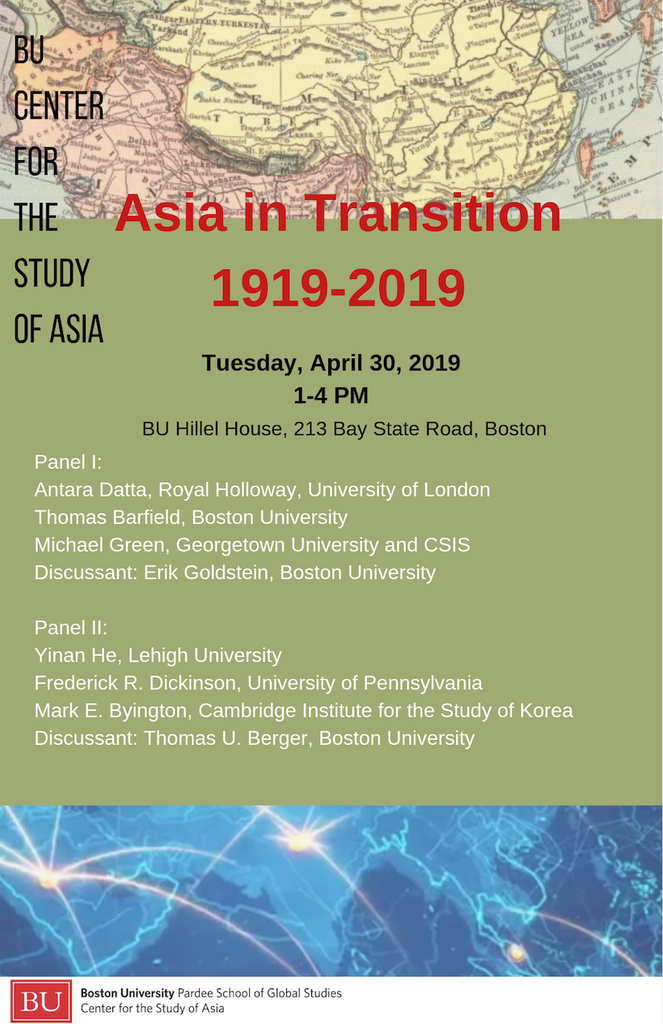
One hundred years ago Asia underwent a wrenching transition. The First World War had shaken the international order to its core, setting in motion forces that would reshape the region for decades to come. In Korea, hundreds of thousands of people joined the March 1st Movement to protest Japan’s continued colonial rule on the peninsula. In China, even larger numbers were mobilized in the May 4th Movement – widely considered to be the first mass nationalist movement in China – to oppose territorial concessions that had been made to the Japanese Empire as part of the Paris peace conference. In India, anti-colonial sentiment reached a fever pitch, leading to the Jallianwala Bagh massacre in Amritsar. The Third Anglo-Afghan war resulted in the independence of Afghanistan and the drawing of the Durand Line separating Afghanistan and what is today Pakistan. Meanwhile, Japan became one of the founding members of the League of Nations, an achievement that was almost immediately soured by the US rejection of the racial equality clause, sowing the seeds of Japan’s alienation from the liberal international order. In short, 1919 was a pivotal moment in Asian history, one whose memory continues to cast a giant shadow over region today.
Today, Asia again appears to be undergoing radical changes. An economically ascendant and militarily increasingly powerful China is asserting its territorial claims more vigorously than ever abroad, while domestically the Chinese Communist Party and Xi Jinping are consolidating power while shifting sharply towards an increasingly harsh authoritarian order. The Moon Jae-in government is desperately trying to move the peace process with Pyongyang forward despite continued disagreement and tensions over the denuclearization of the Korean peninsula. Japan under Prime Minister Shinzo Abe is taking dramatic new steps to enhance its military posture, including the deployment for the first time of its own aircraft carriers. In India, an estimated 900 million people have turned out to vote, passing judgment on the government of Narendra Modi and its policies of economic reform and Hindu nationalism. In Afghanistan, fitful talks are continuing over how to end that country’s 18 year-old insurgency. And overshadowing the entire region is the uncertain role of the United States under President Donald Trump. On the 100th anniversary of the momentous events of 1919, the Boston University Center for the Study of Asia has called together a group of leading scholars to explore the ramifications of 1919 and the connections and parallels between Asia at the start of the 20th century and today. In what ways do the events of 1919 shape the dynamics in the region today? Are there any lessons that can be learned from the past for the present? And are we once again facing a moment in history where a fundamental transition is in the offing?
Speakers:
Thomas Barfield (Boston University), "Disputed Paths to Progress—What to do with Independence: Afghanistan's Still Unresolved 1919 Debates on Secular Modernism vs. Islam as Guiding Principles"
Mark E. Byington (Cambridge Institute for the Study of Korea), "Korean Pseudohistory and Its Roots in the 1919 Independence Movement"
Antara Datta (Lecturer, Royal Holloway, University of London),
Frederick Dickinson (University of Pennsylvania), “Versailles at 100: Japan and the Dawn of a Global Century”
Michael Green (Georgetown University and CSIS)
Yinan He (Lehigh University), "Chinese National Identity in Transition: Impact on East Asia"
Discussants:
Thomas U. Berger (Boston University)
Erik Goldstein (Boston University)
About the Speakers and Discussants:
 Thomas Barfield is Professor of Anthropology and Chair of the Dept. of Anthropology, Boston University. His current research focuses on problems of political development in Afghanistan, particularly on systems of local governance and dispute resolution. He has also published extensively on contemporary and historic nomadic pastoral societies in Eurasia with a particular emphasis on politics and economy.
Thomas Barfield is Professor of Anthropology and Chair of the Dept. of Anthropology, Boston University. His current research focuses on problems of political development in Afghanistan, particularly on systems of local governance and dispute resolution. He has also published extensively on contemporary and historic nomadic pastoral societies in Eurasia with a particular emphasis on politics and economy.
Dr. Barfield conducted ethnographic fieldwork in northern Afghanistan in the mid-1970s as well as shorter periods of research in Xinjiang, China, and post-Soviet Uzbekistan. He is author of The Central Asian Arabs of Afghanistan (1981), The Perilous Frontier: Nomadic Empires and China (1989), and The Nomadic Alternative (1993), co-author of Afghanistan: An Atlas of Indigenous Domestic Architecture (1991), and editor of Blackwell’s Dictionary of Anthropology(1997). Barfield received a Guggenheim Fellowship in 2006 that led to the publication of his newest book, Afghanistan: A Political and Cultural History (2010).
He is also director of Boston University’s Institute for the Study of Muslim Societies & Civilization and currently serves as president of the American Institute for Afghanistan Studies.
 Thomas Berger is Professor of International Relations at the Frederick S. Pardee School of Global Studies at Boston University. Berger joined Boston University in 2001 after having taught for seven years at the Johns Hopkins University. He is the author of War, Guilt and World Politics After World War II, Cultures of Antimilitarism: National Security in Germany and Japan and is co-editor of Japan in International Politics: The Foreign Policies of an Adaptive State. His articles and essays have appeared in numerous edited volumes and journals, including International Security, Review of International Studies, German Politics and World Affairs Quarterly.
Thomas Berger is Professor of International Relations at the Frederick S. Pardee School of Global Studies at Boston University. Berger joined Boston University in 2001 after having taught for seven years at the Johns Hopkins University. He is the author of War, Guilt and World Politics After World War II, Cultures of Antimilitarism: National Security in Germany and Japan and is co-editor of Japan in International Politics: The Foreign Policies of an Adaptive State. His articles and essays have appeared in numerous edited volumes and journals, including International Security, Review of International Studies, German Politics and World Affairs Quarterly.
 Mark E. Byington is the president and co-founder of the Cambridge Institute for the Study of Korea (Cambridge, MA), an organization that seeks to develop academic studies involving Korea and the surrounding region outside of the university setting. He was formerly the founder and project director of the Early Korea Project at the Korea Institute, Harvard University, in which capacity he served as editor of Early Korea, an edited serial publication focused on early Korean history and archaeology, and the Early Korea Project Occasional Series. He received an A.M. degree from the Regional Studies East Asia program at Harvard (1996) and a Ph.D. degree from the department of East Asian Languages and Civilizations at Harvard (2003), with a research focus on the early history and archaeology of northeastern China and the Korean peninsula. He is also a past lecturer in the Department of East Asian Languages and Civilizations at Harvard University, where he taught courses on Korean history and archaeology. He is presently a Research Associate in the Department of Anthropology, Harvard University, and an Affiliated Fellow at the Center for the Study of Asia, Boston University, at both of which he researches and develops programs on the early history and archaeology of Northeast China. He is the author and editor of several publications, the most recent of which is The Ancient State of Puyŏ in Northeast Asia: Archaeology and Historical Memory, Harvard University Asia Center Press, 2016. His primary research interest centers on the formation and development of early states in the Korea-Manchuria region. His current research involves the application of remote sensing and geographic information systems, and particularly the use of historical imagery, in studies of the archaeology and early history of northeastern China.
Mark E. Byington is the president and co-founder of the Cambridge Institute for the Study of Korea (Cambridge, MA), an organization that seeks to develop academic studies involving Korea and the surrounding region outside of the university setting. He was formerly the founder and project director of the Early Korea Project at the Korea Institute, Harvard University, in which capacity he served as editor of Early Korea, an edited serial publication focused on early Korean history and archaeology, and the Early Korea Project Occasional Series. He received an A.M. degree from the Regional Studies East Asia program at Harvard (1996) and a Ph.D. degree from the department of East Asian Languages and Civilizations at Harvard (2003), with a research focus on the early history and archaeology of northeastern China and the Korean peninsula. He is also a past lecturer in the Department of East Asian Languages and Civilizations at Harvard University, where he taught courses on Korean history and archaeology. He is presently a Research Associate in the Department of Anthropology, Harvard University, and an Affiliated Fellow at the Center for the Study of Asia, Boston University, at both of which he researches and develops programs on the early history and archaeology of Northeast China. He is the author and editor of several publications, the most recent of which is The Ancient State of Puyŏ in Northeast Asia: Archaeology and Historical Memory, Harvard University Asia Center Press, 2016. His primary research interest centers on the formation and development of early states in the Korea-Manchuria region. His current research involves the application of remote sensing and geographic information systems, and particularly the use of historical imagery, in studies of the archaeology and early history of northeastern China.
 Antara Datta is Lecturer in International Relations, Royal Holloway, University of London. She earned BA degrees from Delhi University and the University of Oxford, and her MA and PhD from Harvard University. Her first book Refugees and Borders in South Asia: the Great Exodus of 1971 (Routledge, 2012) engages with the aftermath of the process of decolonisation and uses the war of 1971 to examine the creation of "affective" and "effective" borders in South Asia, the subjectivity of minorities, as well as changing ideas about citizenship within South Asia that move beyond the familiar paradigms of region and religion. Her current research looks at the link between border crossers and the creation of ideas about nationality and citizenship in South Asia. In particular she is interested in the expulsion of the Indian diaspora from Burma and Uganda as well as the presence of European refugees in India after WWII. A separate strand of her research examines the manner in which the Indian state has attempted to open up multiple possibilities of belonging for Non Resident Indians. At Royal Holloway, she teaches courses that are influenced by her interest in the making of nations and states in modern South Asia as well as questions of war, violence and displacement in a comparative context, gender and nationalism, and empire and decolonisation.
Antara Datta is Lecturer in International Relations, Royal Holloway, University of London. She earned BA degrees from Delhi University and the University of Oxford, and her MA and PhD from Harvard University. Her first book Refugees and Borders in South Asia: the Great Exodus of 1971 (Routledge, 2012) engages with the aftermath of the process of decolonisation and uses the war of 1971 to examine the creation of "affective" and "effective" borders in South Asia, the subjectivity of minorities, as well as changing ideas about citizenship within South Asia that move beyond the familiar paradigms of region and religion. Her current research looks at the link between border crossers and the creation of ideas about nationality and citizenship in South Asia. In particular she is interested in the expulsion of the Indian diaspora from Burma and Uganda as well as the presence of European refugees in India after WWII. A separate strand of her research examines the manner in which the Indian state has attempted to open up multiple possibilities of belonging for Non Resident Indians. At Royal Holloway, she teaches courses that are influenced by her interest in the making of nations and states in modern South Asia as well as questions of war, violence and displacement in a comparative context, gender and nationalism, and empire and decolonisation.
 Frederick R. Dickinson, is Professor of Japanese History, Co-Director of the Lauder Institute of Management and International Studies, and Deputy Director of the Penn Forum on Japan (PFJ). Born in Tokyo and raised in Kanazawa and Kyoto, Japan, he teaches courses on modern Japan, on empire, politics and nationalism in East Asia and the Pacific, and on World History. He received an MA (1987) and PhD (1993) in History from Yale University and holds an MA in International Politics from Kyoto University (Kyoto, Japan, 1986). He is the author of War and National Reinvention: Japan in the Great War, 1914 - 1919 (Harvard University Asia Center, 1999), Taisho tenno (Taisho Emperor, Minerva Press, 2009) and World War I and the Triumph of a New Japan, 1919-1930 (Cambridge University Press, 2013). Currently, he is working on a global history of modern Japan.
Frederick R. Dickinson, is Professor of Japanese History, Co-Director of the Lauder Institute of Management and International Studies, and Deputy Director of the Penn Forum on Japan (PFJ). Born in Tokyo and raised in Kanazawa and Kyoto, Japan, he teaches courses on modern Japan, on empire, politics and nationalism in East Asia and the Pacific, and on World History. He received an MA (1987) and PhD (1993) in History from Yale University and holds an MA in International Politics from Kyoto University (Kyoto, Japan, 1986). He is the author of War and National Reinvention: Japan in the Great War, 1914 - 1919 (Harvard University Asia Center, 1999), Taisho tenno (Taisho Emperor, Minerva Press, 2009) and World War I and the Triumph of a New Japan, 1919-1930 (Cambridge University Press, 2013). Currently, he is working on a global history of modern Japan.
Dickinson has received grants from the Japanese Ministry of Education, the Fulbright Commission, and the Japan Foundation and was a National Fellow at the Hoover Institution (Stanford University, 2000-1) and a Research Scholar at the International Research Center for Japanese Studies (Kyoto, Japan, 2011-12). He has held visiting professorships at Swarthmore College, Katholieke Universiteit Leuven (Belgium), Kyoto University and Kwansei Gakuin University (Nishinomiya, Japan).
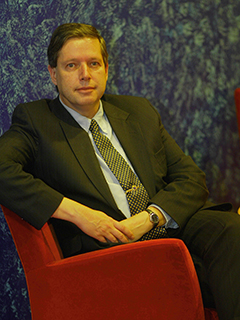 Erik Goldstein is Professor of International Relations and History, Boston University. His research interests include diplomacy, formulation of national diplomatic strategies, the origins and resolution of armed conflict, and negotiation. He has published in numerous journals, including Review of International Relations, Middle Eastern Studies, East European Quarterly, Historical Research, Historical Journal, Byzantine & Modern Greek Studies, and the Hague Journal of Diplomacy. He is the author of Winning the Peace: British Diplomatic Strategy, Peace Planning, and the Paris Peace Conference, 1916-1920 (1991); Wars and Peace Treaties (1992); and The First World War’s Peace Settlements: International Relations, 1918 – 1925 (2002, Italian translation, 2004). He has co-edited The End of the Cold War (1990); The Washington Conference, 1921-1922: Naval Rivalry, East Asian Stability, and the Road to Pearl Harbor (1994); The Munich Crisis: New Interpretations and the Road to World War II (1999); Power and Stability: British Foreign Policy, 1865-1965 (2003); and the Guide to International Relations and Diplomacy (2002). Professor Goldstein was also the founder-editor of the journal Diplomacy & Statecraft and has served on the editorial boards of Byzantine and Modern Greek Studies, Hague Journal of Diplomacy and is currently on the editorial board of International History Review. He has a continuing interest in the training and professional education of diplomats, which began with his participation in delivering the British Know How Fund programs for diplomats from countries in transition during the 1990s.
Erik Goldstein is Professor of International Relations and History, Boston University. His research interests include diplomacy, formulation of national diplomatic strategies, the origins and resolution of armed conflict, and negotiation. He has published in numerous journals, including Review of International Relations, Middle Eastern Studies, East European Quarterly, Historical Research, Historical Journal, Byzantine & Modern Greek Studies, and the Hague Journal of Diplomacy. He is the author of Winning the Peace: British Diplomatic Strategy, Peace Planning, and the Paris Peace Conference, 1916-1920 (1991); Wars and Peace Treaties (1992); and The First World War’s Peace Settlements: International Relations, 1918 – 1925 (2002, Italian translation, 2004). He has co-edited The End of the Cold War (1990); The Washington Conference, 1921-1922: Naval Rivalry, East Asian Stability, and the Road to Pearl Harbor (1994); The Munich Crisis: New Interpretations and the Road to World War II (1999); Power and Stability: British Foreign Policy, 1865-1965 (2003); and the Guide to International Relations and Diplomacy (2002). Professor Goldstein was also the founder-editor of the journal Diplomacy & Statecraft and has served on the editorial boards of Byzantine and Modern Greek Studies, Hague Journal of Diplomacy and is currently on the editorial board of International History Review. He has a continuing interest in the training and professional education of diplomats, which began with his participation in delivering the British Know How Fund programs for diplomats from countries in transition during the 1990s.
Goldstein is a Fellow of the Royal Historical Society (of Britain) and has served as a member of the Advisory Board of the Center for Global Change and Governance, Rutgers University and the Advisory Board of the Centre for the Study of Diplomacy at the University of Leicester (UK). He was elected to the Governing Board of the International Baccalaureate, 2010-16. Goldstein was previously Professor of International History and Deputy Director for the Centre for Studies in Security and Diplomacy at the University of Birmingham (UK) and has held appointments as Secretary of the Navy Senior Research Fellow at the Naval War College; Visiting Scholar, Centre for International Studies, University of Cambridge; Visiting Professor, University of East Anglia, and Visiting Professor at King’s College London. He has also served as the President of Phi Beta Kappa, Epsilon of Massachusetts.
 Michael Green is Director of Asian Studies and Chair in Modern and Contemporary Japanese Politics and Foreign Policy at the School of Foreign Service at Georgetown University. He is also a senior vice president for Asia and Japan Chair at CSIS. He previously served as special assistant to the president for national security affairs and senior director for Asian affairs at the National Security Council His current research and writing is focused on Asian regional architecture, Japanese politics, U.S. foreign policy history, the Korean peninsula, Tibet, Burma, and U.S.-India relations. His most recent book is By More than Providence: Grand Strategy and American Power in the Asia Pacific since 1783 (Columbia University Press, 2017) Dr. Green speaks fluent Japanese and spent over five years in Japan working as a staff member of the National Diet, as a journalist for Japanese and American newspapers, and as a consultant for U.S. business. He has also been on the faculty of the Johns Hopkins School of Advanced International Studies (SAIS), a fellow at the Council on Foreign Relations, a staff member at the Institute for Defense Analyses, and a senior adviser to the Office of Asia-Pacific Affairs in the Office of the Secretary of Defense. He graduated from Kenyon College with highest honors in history in 1983 and received his M.A. from Johns Hopkins SAIS in 1987 and his Ph.D. in 1994. He also did graduate work at Tokyo University as a Fulbright fellow and at the Massachusetts Institute of Technology as a research associate of the MIT-Japan Program. He is a Trustee of The Asia Foundation, a member of the Council on Foreign Relations, and the Aspen Strategy Group, and serves on the advisory boards of the Center for a New American Security and Australian American Leadership Dialogue and the editorial board of The Washington Quarterly.
Michael Green is Director of Asian Studies and Chair in Modern and Contemporary Japanese Politics and Foreign Policy at the School of Foreign Service at Georgetown University. He is also a senior vice president for Asia and Japan Chair at CSIS. He previously served as special assistant to the president for national security affairs and senior director for Asian affairs at the National Security Council His current research and writing is focused on Asian regional architecture, Japanese politics, U.S. foreign policy history, the Korean peninsula, Tibet, Burma, and U.S.-India relations. His most recent book is By More than Providence: Grand Strategy and American Power in the Asia Pacific since 1783 (Columbia University Press, 2017) Dr. Green speaks fluent Japanese and spent over five years in Japan working as a staff member of the National Diet, as a journalist for Japanese and American newspapers, and as a consultant for U.S. business. He has also been on the faculty of the Johns Hopkins School of Advanced International Studies (SAIS), a fellow at the Council on Foreign Relations, a staff member at the Institute for Defense Analyses, and a senior adviser to the Office of Asia-Pacific Affairs in the Office of the Secretary of Defense. He graduated from Kenyon College with highest honors in history in 1983 and received his M.A. from Johns Hopkins SAIS in 1987 and his Ph.D. in 1994. He also did graduate work at Tokyo University as a Fulbright fellow and at the Massachusetts Institute of Technology as a research associate of the MIT-Japan Program. He is a Trustee of The Asia Foundation, a member of the Council on Foreign Relations, and the Aspen Strategy Group, and serves on the advisory boards of the Center for a New American Security and Australian American Leadership Dialogue and the editorial board of The Washington Quarterly.
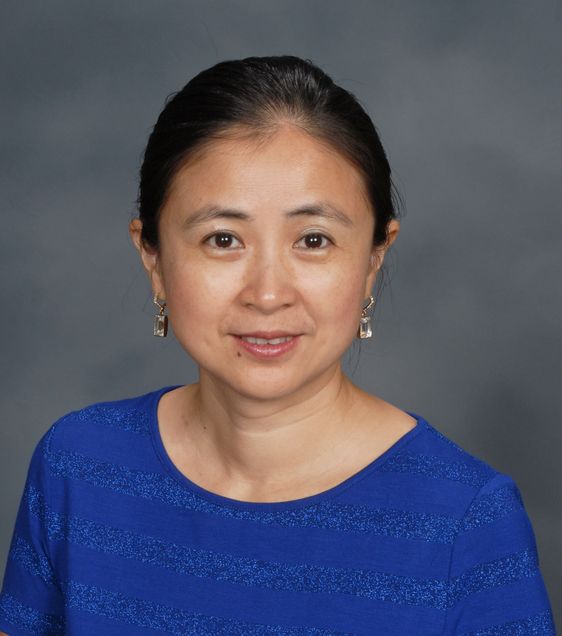 Yinan He is an associate professor in international relations at Lehigh University. She received her Ph.D. in political science from Massachusetts Institute of Technology. Her research focuses on politics of memory and reconciliation, Chinese and Japanese foreign policy, and national identity mobilization and nationalism in East Asia. She is the author of The Search for Reconciliation: Sino-Japanese and German-Polish Relations since World War II (Cambridge University Press, 2009). She was a research fellow of the Princeton-Harvard China and the World Program, An-Wang Postdoctoral Fellow in Chinese Studies at Harvard University, John M. Olin Fellow in National Security at Harvard University, and Jennings Randolph Peace Scholar of the United States Institute of Peace. Her research has also been supported by the National Endowment for the Humanities, MacArthur Foundation, and Japanese Government Mombusho Scholarship, among others. In 2011-2013 she was selected as a Public Intellectuals Program fellow of the National Committee on United States-China Relations. In AY 2018-2019 she is a Visiting Research Scholar at the Center on Contemporary China of Princeton Institute for International and Regional Studies. She holds a B.A. from Peking University and M.A. from Fudan University in international politics.
Yinan He is an associate professor in international relations at Lehigh University. She received her Ph.D. in political science from Massachusetts Institute of Technology. Her research focuses on politics of memory and reconciliation, Chinese and Japanese foreign policy, and national identity mobilization and nationalism in East Asia. She is the author of The Search for Reconciliation: Sino-Japanese and German-Polish Relations since World War II (Cambridge University Press, 2009). She was a research fellow of the Princeton-Harvard China and the World Program, An-Wang Postdoctoral Fellow in Chinese Studies at Harvard University, John M. Olin Fellow in National Security at Harvard University, and Jennings Randolph Peace Scholar of the United States Institute of Peace. Her research has also been supported by the National Endowment for the Humanities, MacArthur Foundation, and Japanese Government Mombusho Scholarship, among others. In 2011-2013 she was selected as a Public Intellectuals Program fellow of the National Committee on United States-China Relations. In AY 2018-2019 she is a Visiting Research Scholar at the Center on Contemporary China of Princeton Institute for International and Regional Studies. She holds a B.A. from Peking University and M.A. from Fudan University in international politics.
Join us! BUCSA Asian Studies Spring Reception! (April 30, 2019)
The BU Center for the Study of Asia invites you to join us at our
BUCSA Spring Reception
on Tuesday, April 30, 2019 from 4:00 to 5:30 pm
at the Florence and Chafetz Hillel House, Boston University,
213 Bay State Rd, Boston, MA 02215
